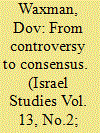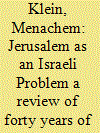|
|
|
Sort Order |
|
|
|
Items / Page
|
|
|
|
|
|
|
| Srl | Item |
| 1 |
ID:
082289


|
|
|
|
|
| Publication |
2008.
|
| Summary/Abstract |
For many years, the debate over whether Israel should withdraw from the West Bank and Gaza dominated Israeli public discourse and aroused intense passions and hostilities. This is no longer the case. This debate is far less divisive and bitter than it once was. In Israel there is broad public support for a withdrawal from much of the occupied territories, and the debate is mostly about the extent, manner, and timing of this withdrawal. This article explains why the policy of territorial withdrawal has become less controversial in Israel in recent years. It examines the debate over the future of the West Bank and Gaza during the years of the Oslo peace process and argues that the debate over territorial withdrawal was then part of a broader cultural conflict. Although this cultural conflict has not been resolved, the issue of territorial withdrawal is no longer at the center of this conflict. The removal of the issue of the territories from this broader cultural conflict has allowed for the emergence of a broad domestic consensus over a policy of territorial withdrawal.
|
|
|
|
|
|
|
|
|
|
|
|
|
|
|
|
| 2 |
ID:
082288


|
|
|
|
|
| Publication |
2008.
|
| Summary/Abstract |
In the wake of the June 1967 war Israel annexed Jordanian Jerusalem and adjoining territories, creating a single municipality with a large Palestinian Arab minority. After forty years Jerusalem is still a frontier city. In this article I show how and why Israel failed to achieve its goal to unite the Palestinian and Israeli cities. Consequently Israel developed several strategies to overcome her failure, ignoring the inability to achieve the unachievable goal. Therefore I argue for accepting the unavoidable partition of the city into separate Palestinian and Israeli municipalities due to its social, economic, and geographic realities.
|
|
|
|
|
|
|
|
|
|
|
|
|
|
|
|
| 3 |
ID:
082286


|
|
|
|
|
| Publication |
2008.
|
| Summary/Abstract |
The Jewish-Israeli case-that of the Jewish people, the Jewish national movement-Zionism-and the Jewish nation-state-Israel-is often said to be unique. Its unique features are said to be the "extra-territorial" character of the Jewish people and Israel's ties with the Jewish Diaspora (expressed, most controversially, in the Law of Return) and the strong connection between the Jewish religion and the prevalent notion of Jewish peoplehood. Some argue that these features of the Jewish-Israeli national identity are inconsistent with modern civic democracy; many others defend or even celebrate them, pointing to the uniqueness of Jewish history and culture. The underlining premise of uniqueness itself is rarely questioned. In fact, however, it appears that this case is far less unique in the modern democratic world than is widely assumed. There are numerous other cases where national identity and religion are officially connected in some way, and where there are official bonds between a nation-state and an ethnocultural Diaspora.
|
|
|
|
|
|
|
|
|
|
|
|
|
|
|
|
| 4 |
ID:
082290


|
|
|
|
|
| Publication |
2008.
|
| Summary/Abstract |
Shurat ha-Mitnadvim was founded in the winter of 1951-1952 by students from the Hebrew University as a volunteer organization promoting norms of good citizenship by furthering the social integration of new immigrants and exposing prodigality and corrupt practices in the public sector. Shurat ha-Mitnadvim offered a structural and ideological alternative to the dominant model of civil organizing that persisted from the Yishuv (pre-statehood) to the early statehood period, which was accepted with relative tolerance during most of Shurat ha-Mitnadvim's years of activity. At a certain stage, however, it found itself in a head-on confrontation with the state authorities that it criticized and with political parties and other national-level suborganizations (the Jewish Agency and the Federation of Labor in Israel). These institutions regarded themselves as the main mediators between the citizen and the governing authorities and therefore as more "legitimate" than Shurat ha-Mitnadvim. The whole affair and its main characteristic, the novelty of the challenge that it expressed, and the reverberations that the activity of a civil-society organization sent through the reality of a young, self-defensive democracy, are the focal points of this article.
|
|
|
|
|
|
|
|
|
|
|
|
|
|
|
|
| 5 |
ID:
082287


|
|
|
|
|
| Publication |
2008.
|
| Summary/Abstract |
On the thirtieth anniversary of the Yom Kippur War, there were lengthy discussions about the war's repercussions, on the element of surprise, operational failures, Israel's intelligence blunders, and the poison darts that Israeli generals flung at one another. Terra incognita among the conferences, articles, and interviews was an analysis of the origins of Sadat's strategic volte-face after he acceded to power in late September 1970, and his steps prior to and after the war. This article analyzes the origins this determining factor behind his decision to pursue limited objectives in the October 1973 War and to visit Jerusalem in November 1977. It has been assumed that Sadat's peace initiative was the direct result of Egypt's strategic victory in the 1973 war. However, the war's initiative-and especially its results-only accelerated the political process that Sadat began in 1971
|
|
|
|
|
|
|
|
|
|
|
|
|
|
|
|
|
|
|
|
|